#Economics Dissertation Writing
Explore tagged Tumblr posts
Text
Uncover the key strategies and techniques for creating an outstanding economics dissertation with our in-depth guide. Delve into a wealth of valuable tips, receive expert advice, and master practical strategies to elevate your writing journey and achieve excellence in your academic work.
#techniques for creating an outstanding economics dissertation#Economics Dissertation#Economics Dissertation Help#Economics Dissertation Writing#Assignment help#assignment expert
0 notes
Text
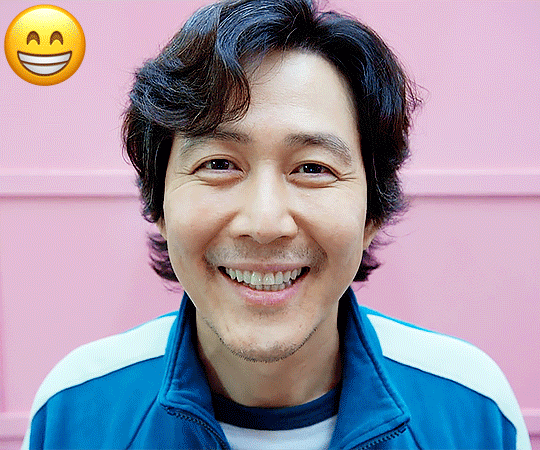



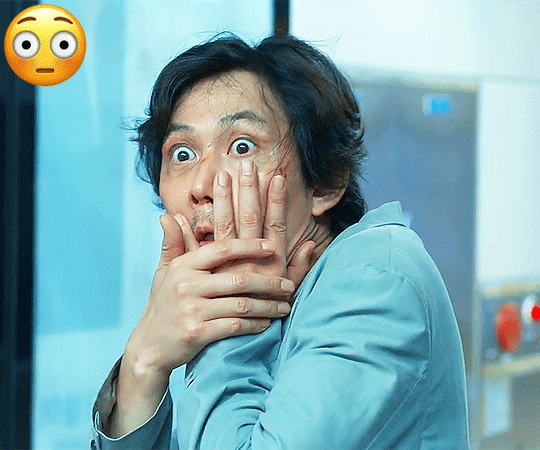
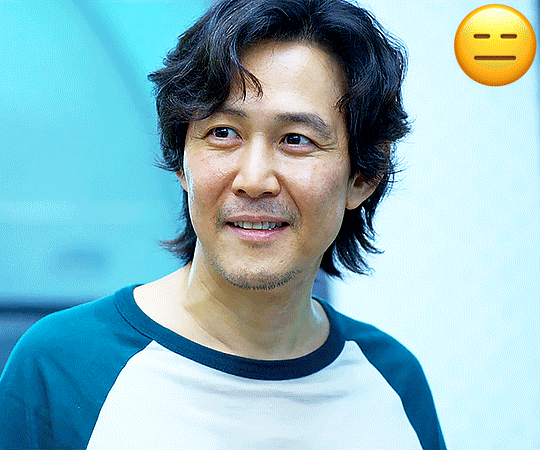

#squidgameedit#squidgamegif#seong gi hun#sometimes im like lets study philosophy economics literature and sociology and write a dissertation#and sometimes im like awwwww wook at his wittle face#there are 2 wolves inside me#balgif
284 notes
·
View notes
Text
Greetings. In the midst of this disheartening academic labyrinth, I seek your solace and counsel.
My pursuit revolves around the desolate realms of international and financial economics, a domain veiled in obscurity. Alas, I yearn for a topic ensconced in the gloom of uncharted territories, where secondary data is but a dim glimmer. This melancholic quest seeks the embodiment of uniqueness, as existing paths lay shrouded in repetitiveness.
Should you harbor insights that pierce the darkness and unearth untrodden paths, I beseech you to cast them upon this forlorn page. Your wisdom could cast a feeble light on this dreary path, guiding me toward a desolate but unexplored research niche. Eternally grateful for your somber companionship on this academic odyssey.
#mine: text#bpd#college#i hate exams#dark academia#AcademicDesolation#ResearchDepths#EconomicGloom#Economics#studyblr#dissertation#identity crisis#academic writing#dissertation writing#assignments#assignment help#assignment writing service#research
7 notes
·
View notes
Text
OFFERING SCHOOL ASSIGNMENT ASSISTANCE SERVICES AT A FAIR PRICE!!CALL/ WHATSAPP/SMS @+1 (512) 882-4013
#allcourses#onlineclasses#dissertation#research#essay#math#academicwritingassignments#homeworkhelp#proposal#article#anatomy#history#philosophy#psychology#English#powerpoint#paperdue#history#quiz#casestudy#discussion#algebra#bestassignmenthelp#essaywriter#essaywriting#schoolassignment#collegewriting#universityassignment#assignmentwriting#assignmentsupport

View On WordPress
#allcourses#anatomy#assignments#assignmentwriting#bestassignmenthelp#collegewriting#Academic writing services#academicwritingassignments#algebra#article#discussion#dissertation#Duke University#Economics#essai#essay#Haverford College#Homework#Kent state university#Market research#Massachusetts Institute of Technology#Medical writing#Middlebury College#overduepaper#philosophie#Philosophy#Physics#Pomona College#PowerPoint#Princeton University
0 notes
Text
207 Best Accounting Dissertation Topics & Ideas
Before you seek assignment help for students online, here is your comprehensive guide on 207 best accounting dissertation topics that can help you to create impactful dissertation...
Learn more: https://www.thewritesmarter.com/blog/best-accounting-dissertation-topics-ideas/
#assignment help for students#Economics Dissertation Topics#accounting assignment help#assignment writing help#assignment services#assignment writing service#programming assignment help
0 notes
Text
i had to read and reread so much of marx's writing for my dissertation and i did not find it particularly fun nor at all easy. economic and philosophic manuscripts of 1844 is about as dense as it gets and i complained about it at length while i was reading it and found it often times extraordinarily hard to wrap my brain around and the things that i did to further my understanding of the material that i was not initially understanding involved 1) reading the text multiple times 2) talking to people about it and 3) reading rigorous academic critiques and responses to it. what i did not do was go onto genius dot com and pretend that reading random internet annotations would be a reasonable substitute for parsing the text itself or engaging with other academic analyses. hope this helps!
789 notes
·
View notes
Text
Saito has made a career of teasing out an eco-theory from the late, unpublished writings of Karl Marx. He earned his doctorate at Humboldt University, in Berlin, and now teaches philosophy at the University of Tokyo. His first book was an English version of his dissertation, titled “Karl Marx’s Ecosocialism” (2017), which tracked Marx’s study of the physical world and communal agricultural practices. (Saito is fluent in Japanese, German, and English.) In a second academic book, “Marx in the Anthropocene” (2022), Saito drew on an expanded repertoire of Marx’s unpublished notebooks to argue for a theory of “degrowth communism.” He gained a following, not only in philosophical circles but among a Japanese public facing the contradictions of tsunamis, billionaires, and same-day shipping. “Slow Down” has sold more than half a million copies in Japan and launched Saito into a rare academic celebrity. He appears regularly on Japanese television and aspires to the public-intellectual status of Thomas Piketty, the French economist who had a surprise hit in his 2013 doorstop, “Capital in the Twenty-first Century.”
The key insight, or provocation, of “Slow Down” is to give the lie to we-can-have-it-all green capitalism. Saito highlights the Netherlands Fallacy, named for that country’s illusory attainment of both high living standards and low levels of pollution—a reality achieved by displacing externalities. It’s foolish to believe that “the Global North has solved its environmental problems simply through technological advancements and economic growth,” Saito writes. What the North actually did was off-load the “negative by-products of economic development—resource extraction, waste disposal, and the like” onto the Global South.
If we’re serious about surviving our planetary crisis, Saito argues, then we must abandon capitalism, with its insatiable appetites. We must reject the ever-upward logic of gross domestic product, or G.D.P. (a combination of government spending, imports and exports, investments, and personal consumption). We will not be saved by a “green” economy of electric cars or geo-engineered skies. Slowing down—to a carbon footprint on the level of Europe and the U.S. in the nineteen-seventies—would mean less work and less clutter, he writes. Our kids may not make it, otherwise.
1K notes
·
View notes
Text
Every week we are reading about professions that are pushing out Zionist Jews from their fields.
In the field of international law:
...The professor saw a trend among the topics Israeli and Jewish colleagues were pushed to pursue. Those who continued their academic work in international law either wrote about Palestinians as victims or Israel’s violations of humanitarian international law. “Israelis would either write about IP law or business law, or about how Israel is being awful, violating human rights and all of that.”
This stood out because the professor noticed their colleagues from Latin America and China weren’t expected to work on topics that criticize their home countries as a condition for receiving faculty support. Yet when it came to Israelis, it was “clear to us this is what we need to deliver on.”
In the professor’s discussions with the senior faculty, especially the progressive liberal Jewish faculty, it came through clearly that support for Israeli students was conditioned on being the right type of Israeli, “and there were fellowships and scholarships and grants available to students who are willing to do that. In Hebrew we say that a person knows which side of the bread is buttered, right? So it’s pretty clear what pays off is to distance yourself from a mainstream Israeli kind of discourse.”
Understanding who holds the power and influences decisions is important in any profession, the law included. “You need to have the support and the mentors to advance in your career,” the professor explained, “and for that, you look for cues on what should I do, how do I make these people like me. Why would you bother, why would you take the risk of saying something that is controversial or put yourself in the position of protecting Israel or speaking on behalf of Israel when there is only a price to pay for that?”
“For example, there is an institute that gives out scholarships to doctoral students who are writing dissertations about Israel. I was advised not to take their money because then it’s going to be on my CV and people will interpret that as if I don’t have the right kind of politics. So even when there are economic incentives to write different kinds of scholarship,” under the current academic incentives, the professor concludes, scholarships and point-interventions will not work “because it’s more about selection and authority and networks and connections and less about economic incentives.”
Mental health professionals:
The anti-Zionist blacklist is the most extreme example of an anti-Israel wave that has swept the mental health field since the Oct. 7 Hamas terror attacks and the resulting war in Gaza, which has seen the deaths of thousands of Palestinian civilians. More than a dozen Jewish therapists from across the country who spoke to Jewish Insider described a profession ostensibly rooted in compassion, understanding and sensitivity that has too often dropped those values when it comes to Jewish and Israeli providers and clients.
At best, these therapists say their field has been willing to turn a blind eye to the antisemitism that they think is too rampant to avoid. At worst, they worry the mental health profession is becoming inhospitable to Jewish practitioners whose support for Israel puts them outside the prevailing progressive views on the Israeli-Palestinian conflict.
Authors:
Over the past several months, a litmus test has emerged across wide swaths of the literary world effectively excluding Jews from full participation unless they denounce Israel. This phenomenon has been unfolding in progressive spaces (academia, politics, cultural organizations) for quite some time. That it has now hit the rarefied, highbrow realm of publishing — where Jewish Americans have made enormous contributions and the vitality of which depends on intellectual pluralism and free expression — is particularly alarming.
It feels like history is repeating itself.
Jews founded the Jews' Hospital in New York in 1855, now known as Mount Sinai Hospital, partially as a response to the need for a place that Jews could be treated without feeling like outsiders, as every other hospital at the time was aligned with various Christian groups. It followed the founding in 1850 of the Jewish Hospital in Cincinnati. When Mount Moriah Hospital Mount Moriah Hospital opened in New York in 1908, the Forward reported that Jews "can open the door and enter as if to your own home without a racing heart and without fear."
Brandeis University was founded in 1948 "at a time when Jews and other ethnic and racial minorities, and women, faced discrimination in higher education."
Jews who were facing discrimination formed professional associations and schools in the late 19th and early 20th centuries, for physicians, scientists, and trades, like the Hebrew Technical Institute in New York and the Kehillah which attempted to be an umbrella of professional and educational associations in New York (and that the antisemite Henry Ford railed against.)
It appears that it is time for Jews in the professions where they are being blacklisted must start to form Jewish professional organizations, educational networks and institutions anew, where Jews can network and publish as they want without having to please the "progressive" crowds.
But the arc of history is going backwards, and this is only a Band-Aid. The problem is with America and the world itself, and Jews cannot solve this problem alone - the dangers of the progressive bigots are a threat to the free world and that needs to be addressed at the macro level.
171 notes
·
View notes
Text
Yukiko’s Castle of Escapism
I really love Yukiko’s dungeon and want to talk about it. I think the imagery in it is great and conveys her character very well. This writeup was honestly long overdue, I should’ve written it back in like February.
I’ve said it before (major spoilers!), but I believe the crux of Yukiko’s story is her relationship with power and how she originally feels she has no control over her life, before learning she has more agency than she believes.
I want to drop a lot of context first, though.
Contextualizing the Amagi Inn
So, one of the first things we learn about Yukiko is that she is the heiress of the Amagi Inn. But what does that mean to her? What is the Amagi Inn and why does she feel so much pressure to inherit it?
Well, the Amagi Inn is a ryokan. Which, “inn” is a pretty good way to translate the word, but ryokans have a lot more diversity than most Western inns do. They also have hot springs, called onsen (温泉)!
Chris McMorran, in his book Ryokan: Mobilizing Hospitality in Rural Japan, discusses the difficulty of the job of the family that owns a ryokan.
This convergence of home and workplace in time and space, along with its relative lack of privacy, makes some ryokan owners feel trapped. Managing a ryokan is a twenty-four-hour a day, year-round commitment. Most of the face-to-face hospitality occurs between 6:00 a.m. and 9:00 p.m., but someone needs to answer late-night requests or emergencies. These calls typically go directly to the owners’ residence. They answer the 2:00 a.m. request for an extra blanket or the occasional desperate plea from a woman fleeing an abusive spouse and begging for the physical safety that will come with a job (see chapter 7). Busy inns like Yamazakura close only a few days a year for maintenance and major family events like weddings or funerals.
[Source] located on page 62
As for Yukiko's role, she is in training to be the okami of the ryokan. Which is easily the most important role in the ryokan in total. The Japan Ryokan Association's website describes the role of an okami in the ryokan pretty well.
The okami not only bears the greatest responsibility for waiting on and taking care of guests but also acts as the chief service manager on behalf of the ryokan. The okami's role corresponds to that of a general manager in a Western hotel. In many cases, the okami is the owner of the ryokan or the wife of the owner, which means that the okami, as the representative of the ryokan, attends to all external affairs such as business matters and cooperation with the local community. [...] In the majority of ryokans, the role of the okami is handed down from mother to daughter or to daughter-in-law. In either case, the younger generation studies under the older generation, and devotes herself to mastering the responsibilities and principles of the position of okami.
[Source] page 62
In Yukiko's case, the implication is mother to daughter, as she is the only child of the owner of the Amagi Inn and her husband.
Furthermore, Chie calls the Amagi Inn “the pride of Inaba,” and describes it as basically what’s keeping Inaba economically afloat in the first place, and with the advent of the Junes competition, there’s even more pressure on the Amagi Inn as a bastion of Inaban culture.
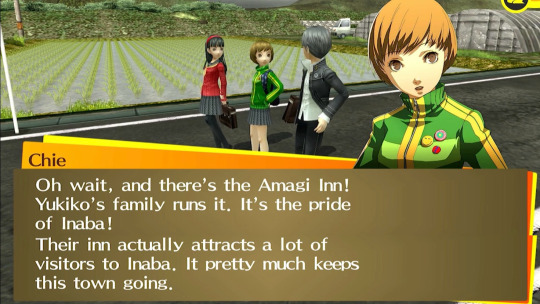
Traditional Japanese femininity and the Amagi Challenge
Yukiko also is seen by her peers, male and female, as a personification of traditional Japanese femininity, a "Yamato Nadeshiko." Now, if you don't know what that is, it's the traditional ideal of a Japanese woman. Satoko Kakihara in her dissertation about Japanese femininity titled Flowers in Contradiction: Japanese Imperialism and Gender Construction Through Women’s Writings, 1895–1945 succinctly describes exactly what that is.
Another common label in Japanese discourse is the cliché of the Yamato nadeshiko (大和撫子), a phrase that describes the figure of a beautiful woman, the kind of elegant, flower-like beauty that has become naturalized and idealized in Japanese society. Nadeshiko (撫子) is Japanese for the genus of flowers called Dianthus, which includes more commonly known species such as the carnation; Yamato (大和) is another name for the nation of Japan, used also in phrases such as Yamato damashii (大和魂, the Japanese spirit), which essentialize and valorize Japanese nationalism. Yamato nadeshiko thus literally indicates a flower that belongs to, or is native to, the Japanese nation, embodying its positive and requisite characteristics. This standard of female beauty points to a particularly Japanese female beauty that is found only among the “Japanese”, perhaps even recognized or appreciated by only the Japanese as well—a beauty prized in a society that places significance on nature, the passing of seasons, the grace of flora that enriches the Japanese environment.
[Source]
This leads to her being distinctly sought after by the male students around her. Even older guys who don't actually have any romantic interest in her, like the reporter who interviews her before she's thrown in the Midnight Channel, comment on how beautiful she is and how she must have many suitors. But when it comes to the male students, she has had approximately zero interest in any of them. Even her best friend Chie comments on it.

Which... only makes them more determined for some creepy reason. They made a game out of it, the "Amagi Challenge," to see who the hell is going to get Yukiko as his actual girlfriend, and if he gets rejected, how brutally?

So Yukiko just constantly gets thrown around and hit on, much to her understandable aggravation.
The Castle Itself
So let’s start with the layout of Yukiko’s dungeon. It’s a castle. But an odd detail about it and the aesthetics of the shadows within is that it looks nothing like Japanese castles you’d see all over, well, Japan, which is Yukiko’s home country. It looks very European, resembling more specifically Mediterranean architecture. The shadows within also keep this trend of Western Renaissance-era clothing rather than anything that a Japanese person would be familiar with in their history, such as her fifth floor miniboss, the Avenger Knight, or her post-dungeon boss, the Contrarian King.
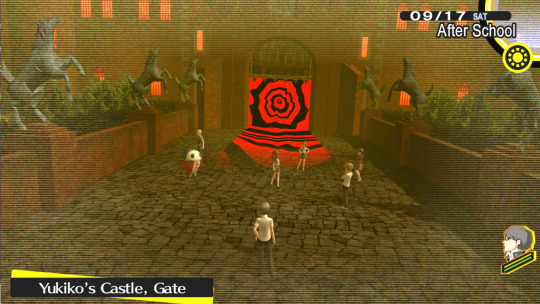

Part of the image Yukiko presents from her physical appearance is that of a traditionally feminine Japanese woman. Her hair is in a princess cut. And she states herself that she has never left Inaba.

Yukiko’s Shadow, Konohana Sakuya, keeps saying throughout her dungeon that she wants a prince to take her far, far away, to run away where nobody can find her.
Notably, Yukiko’s own breaking point leads to her admitting she wants to run the hell away herself, which is in Floor 6 of her dungeon, features an interview from a reporter that touches on two huge sources of stress for Yukiko: namely the unwanted attention she gets from her male peers and the fact she is the heiress to the Amagi Inn--in this scene she's recalling being asked about the Amagi Inn by a fellow student
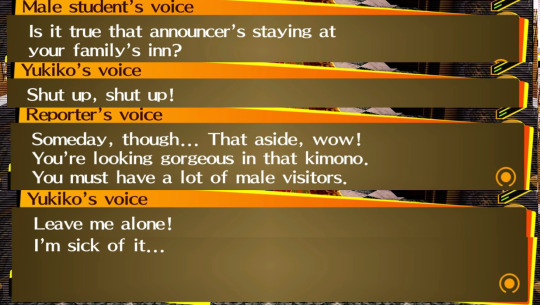
When it comes to the stress on her from her male peers, she understandably doesn’t like the idea of just being seen as a prize to be won, which they clearly act like she is.
She sees everything in Inaba and her association with it as a cage, and uses the idea of this Western castle as an escape because it’s so starkly different from everything she knows—there’s no way Yukiko would be recognized here.
The music in the dungeon has almost no traditional instruments either. It's full of chaotic synths, incredibly modern instruments. It has a slower, gentler side, but still nothing like a shamisen or a flute is audible in the music piece.
Konohana Sakuya, Yukiko’s Shadow
Now let’s move on to her shadow. Her Shadow, later her Persona, is named Konohana Sakuya. If you don’t know who Konohana Sakuya-hime is, she’s the goddess of Mount Fuji, and has some pretty significant impact on Japanese culture—her presence is hugely important to Yukiko’s character. But she is not just the goddess of Mount Fuji. She’s the maternal great-grandmother of Emperor Jimmu, the first Emperor of Japan, and she is considered the goddess of motherhood and one of the most beautiful deities in existence.
There’s a pretty good summary in the Encyclopedia of Shinto in Kokugakuin University.
Konohanasakuyahime became pregnant in a single night, and asked Ninigi to make special preparations, since she would be giving birth not to an ordinary individual, but to a child of the heavenly kami (amatsukami). Ninigi, however, was surprised at her claim to have become pregnant in a single night, and suspected that the child was actually the offspring of an earthly kami (kunitsukami).
Shamed and enraged at Ninigi's accusation, Sakuyahime entered a doorless parturition hut, setting fire to it with the vow that the child should not be injured if it were truly the offspring of the heavenly kami. Ninigi. Inside the hut, Sakuyahime gave birth to three kami, including Hoderi, Hosuseri, and Hoori (according to Kojiki; the names differ somewhat in the various other accounts).
[Source]
Sound familiar? Yukiko’s often sought after for her beauty, and actually, much like Konohana Sakuya-hime, is associated with transience because of the latter’s association with cherry blossoms, which only bloom for a very short time before giving way to leaves.
Right before we meet Tomoe, who is Chie’s Shadow, Yukiko’s thoughts talk about how little she thinks of herself and how much she hates her name precisely because of its association with transience, as her first name (雪子) literally translates to “snow child” or “snow girl.” Yukiko states she believes that because of that short lived nature of snow, that she's only meant to inherit and continue the inn as the okami and nothing more. She believes that is the only fate for her because of how low her self-esteem is.

I spoke about the pressure on Yukiko from the expectation to be the next okami of the Amagi Inn. But I didn't quite talk about how that ties into her relationship with her status as a woman, which is actually much more tied with the Amagi Challenge than you'd think. Something I didn't mention about the role of the okami is one specific detail: the fact she's also to create a successor and train the next manager and okami of the ryokan, as mentioned in McMorran's book.
This ideal of the eldest son as successor places intense pressure on ryokan families to produce a male heir and on eldest sons to accept the duty. However, a disproportionate burden falls on the emotions and bodies of okami. Ryokan owners, male and female, current and retired, frequently told me the most important job of an okami was to bear a son.
[Source on page 83]
It's pretty related to Konohana Sakuya-hime's importance as one of the ancestors of the Imperial dynasty of Japan, as her display of loyalty was to set the house she was giving birth in on fire to show that the kids she was having were actually fathered by Ninigi.
But it's a clear display of the pressure on Yukiko to marry a guy in order to head the Amagi Inn. But according to both herself and Chie, Yukiko hasn’t even had any male friends, let alone a male lover.
And furthermore, you know how I mentioned she’s considered the goddess of beauty and Mount Fuji? That’s a pretty huge piece of Japanese cultural identity, which further ties Yukiko to her status as a Japanese person who is deeply tied with Japan's traditional culture.
Now let’s look at Konohana Sakuya, the Shadow’s, design. She’s a princess, just like her mythological self. But she’s not portrayed as a Japanese one at all. Much like the Shadows and the castle’s layout, Konohana Sakuya adorns herself in a Western princess’ clothing.

Note, princesses are the female children of the royal family according to history. But normally, a princess is not going to be the heir to the throne despite the power she’s supposed to have as a daughter of the most powerful family in the kingdom. Instead, princesses tended to be married off as ways for kings to consolidate power, and usually she never had a say in this situation. So Konohana Sakuya being portrayed as a Western princess represents two things:
1. The perceived denial of power that’s supposed to belong to Yukiko as princesses were denied power for being women despite being royalty
2. The sense of desiring escape from her life by visually rejecting everything she associates with the inn, which includes the traditional Japanese architecture and fashion she’s used to in her life.
Now let’s analyze her Midnight Channel Episode, very clearly based on the idea of the Amagi Challenge, where people have to win “Yukiko’s” affection to be her prince. And it’s pretty clear Yukiko’s basically considered the princess of Inaba, from Chie’s words about her family’s ryokan being the economic backbone of the city. It’s also highly sexualized, which is going to be a theme in the Midnight Channel Episodes, but in Yukiko’s case this sexualization comes from the Amagi Challenge and how she is seen as a gold standard for traditional Japanese femininity. She doesn't feel like anyone can see her as anything else whatsoever, so Konohana Sakuya is, in a sense, giving into what she sees as her fate by sexualizing herself.

Also, the way she presents herself once actually in her dungeon is very clearly meant to invoke the damsel in distress archetype so common in folklore and in video games. Nintendo, even, has frequent damsel in distress stories, and their video games are a modern creation despite they themselves being made in 1889. Damsels in distress frequently do not have much in the way of agency, only meant to be rescued by male protagonists, like how Pauline is rescued by Mario from Donkey Kong in the Donkey Kong games, and Princess Peach (sometimes) in the Super Mario games. These damsels by game mechanics are just destinations, prizes to be won, just as Konohana Sakuya portrays herself to be in her Midnight Channel Episode.
Konohana Sakuya is meant to show how Yukiko feels she has so little control over her life, that she feels she has to meet the expectations of everyone around her, even if she doesn’t want to. Not only that, but she represents Yukiko's relationship with loyalty and connection through her being drawn to Yu, Yosuke and Chie as her "princes," methods of escape from her perceived fate.
Yu and Yosuke are obvious. Yu is a guy from the city and has seen tons of things that Yukiko has never seen before due to living in Inaba all her life, so he represents a life she's interested in living. And Yosuke is the son of the Junes manager, and Junes is seen as an enemy to Inaba, so being with him, likely by working at Junes as she rejects him when he asks her out, would be an active sense of rebellion. But Chie is special. Chie is someone she's known for a long time and therefore trusts the most--and aside from that, Chie is not a guy. She's a girl. Which means unless they adopt (or Chie is transgender without bottom surgery, which is not implied to be the case), there is absolutely no way for Yukiko and Chie to produce a child together. But Konohana Sakuya has eventually come to the conclusion that despite how much Chie means to Yukiko and by extension herself, Chie cannot save her from this situation, likely because Konohana Sakuya realizes her and Yukiko's bubbling jealousy of Chie means that can tear the two of them apart and make Chie a less viable or stable option of escape.
How much or little power does Yukiko have?
Yukiko is the only daughter of the Amagi family. Zero siblings are mentioned whatsoever. So all eyes are on her to lead the ryokan because there's no other known heir, and it seems that everyone just assumed Yukiko would take over the Amagi Inn. Furthermore, Yukiko cannot escape the sexualization of the boys around her despite her repeatedly rejecting their advances, the sheer fact they make a challenge out of it shows how little she is truly respected.
All of this on top of the fact that the job of a ryokan worker can lead to very little privacy, from childhood to adulthood, can lead to the working family members such as Yukiko feeling trapped. And considering Yukiko is an only child, if she does not inherit the inn, who will? The inn might be forced to close, putting more pressure on Yukiko.
And this culminates in Konohana Sakuya's rant:
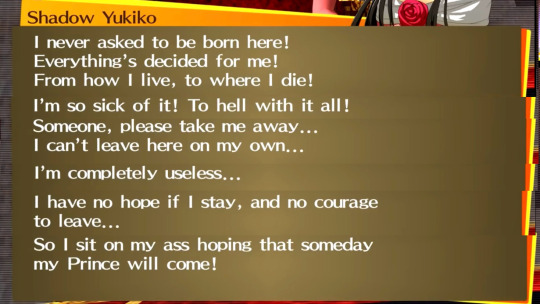
Yukiko believes that she has no control over her life, and a bitter resentment is growing from that perceived lack of control. Tomoe, Chie's Shadow, points out the bubbling jealousy that Yukiko feels over Chie Satonaka, her best friend, for not having so much unwanted male attention on her.

And Konohana Sakuya insults the inn, as she sees it as a source of stress and a prison. This Western portrayal of a princess is her rejecting this perceived cage that her status as a traditional Japanese heiress gives her. Konohana Sakuya implies that she believes the only way to get out on her own is to sever ties with her family, especially since when she initially starts seeking various jobs, she starts out hiding this fact from her family.

But, there’s actually way less pressure on Yukiko than she initially believed, as shown by a little detail: Konohana Sakuya’s berserk design. She’s a bird in a gilded cage. (One friend pointed out she actually could be considered a lovebird considering the heart on her chest, symbolizing how she's tired of being pursued by the male students around her. I thought that the heart represented how she wanted help from loved ones outside of the inn to escape her situation.)

Of course the sexualization of her because of her femininity is something out of her control, but something she learns isn’t is whether she inherits the inn or not. She doesn’t have to at all. There were already hints other than Konohana Sakuya that her family is more open-minded than she thought, simply because Yukiko is an only child and therefore has no brothers, and sons are seen as the ideal to head ryokans as we've established. But she’s a daughter and she was considered a satisfactory heir. But at the epilogue of her social link, she confirms it.

Her family and their workers are totally okay with her doing what she wants, because they love Yukiko. No strings attached, they just straight-up adore her. They want her to be happy and if that happiness can't come from the inn, that's fine. Yukiko’s the one in control of her life. And she doesn’t need to burn any bridges at all, she’ll be supported all the way through.
Yukiko doesn't really have to escape from anything, at least not related to the inn. She can leave it entirely if she so pleases, and she has Chie and the rest of the Investigation Team by her side. And now she's realized she has everyone at the inn, too.
28 notes
·
View notes
Text

The Mysteriously Brilliant Student.
—————————————————————————
Night Raven Colle Leaders x R.femele
—————————————————————————
Everyone thought you were just an adorable girl, kind of flying, who kept forgetting the books and making silly jokes. Until, by accident (or loving curiosity), they see your school record.
Not only are your grades absurdly high (A++ in everything), but your works have deep analysis, elegant writing and you still volunteer, cultural events and help the school administration in secret.
And that's when they run out of ground.
—————————————————————————
.
.
Riddle Rosehearts (Heartslabyul)
Riddle always gave you little affectionate scolding for forgetting the time or missing a quote from the rules.
Until, reviewing the bulletins for the next ceremony, he comes across your name... at the top of the overall ranking.
"What?! The first place?!”
He turns pale.
"But she... confused Plato with Pokémon last week!"
When he finds you, you're blowing soap bubbles in the garden.
"Have you... fooled me all this time?"
You smile innocently:
"Uhé, you never asked how good I was writing 20-page essays on political philosophy."
Riddle shes deeply.
"So... do you mean you're perfect? ...Damn, now I feel doubly in love."
⸻ ————————————
Leona Kingscholar (Savanaclaw)
Leona always thought you were cute, but lazy. Like someone who took C+ and forgot he had proof.
Until he saw his history and crashed.
"This girl... takes A++ in everything?!"
He frowns.
"Is this some kind of provocation? So brilliant and acts as if he doesn't know how to do the head?"
He stares at you later, arms crossed.
"How many years have you been hiding behind this innocent little way, huh?"
You:
"Since I realized that it's fun to see the pride of others dismount when they find out."
Leona laughs, pulls you to her lap:
"You are the definition of camouflaged danger... my favorite type."
⸻ ————————————
Ashengrotto Blue (Octavinelle)
Azul thought you were distracted and terrible for business, until he found a report you wrote about applied magical economics. With unprecedented theories.
"This... this analysis... did she even understand the concept of temporal compound interest?! And why are you here... with little stars drawn in the corner?!”
He stares at you, disconcerted:
"Are you a genius disguised as a cheerful fool?"
You, chewing a cupcake:
"It's just that if I look very smart, no one gives me candy."
Blue chokes.
"Wedding. Now."
⸻ ————————————
Vil Schoenheit (Pomefiore)
Vil thought you were dedicated to aesthetics, but a little disconnected from the academic part. Until seeing his dissertation on philosophical aesthetics in classical literature.
He holds the paper as if it were a jewel.
"Did you write that?"
"Uhum. I finished while waiting for my hair tonic to dry."
Vil blinks slowly, as if he were facing a miracle.
"You... are you smart, beautiful, kind and still do volunteer work? Why isn't it reigning in a palace?"
You:
"Because I prefer to stay here... with my king of beauty."
Vil smiles, enchanted:
"You are my hidden masterpiece."
⸻ ————————————
Idia Shroud (Ignihyde)
Idia thought you were the type to confuse USB with a cookie. Until you saw that you are a medalist in logic, cryptography olympiads and still write essays about AI.
"E-She is an S+ in mathematics, literature, psychology... and helps in magical literacy programs! Is this a bug in reality?! An NPC with cheat codes?!”
You appear soon after, offering a cookie decorated with emoji faces.
"Look, I made this one thinking of you!"
Idia is shaking.
"You're like... the secret protagonist of the anime. I'm just the lucky NPC who became the boyfriend."
You laugh and kiss him on the forehead.
"My favorite NPC."
⸻ ————————————
Malleus Draconia (Diasomnia)
Malleus already thought you were mysterious and intriguing... but when he saw that you give lectures in smaller magical schools, write essays on draconic history and lead social actions in remote villages...
"She... is a queen hidden among plebeians?"
He finds you looking at the clouds, making drawings with the wand in the air.
"My dear, why didn't you ever tell me?"
"I like to be just 'your distracted girl' when I'm with you. But the world needs my other version too."
He smiles, touching his hand.
"So I'll be proud to share you with the world... but your heart, that's only mine."
⸻ ————————————
Kalim Al-Asim (Scarabia)
Kalim always loved you - she thought you were fun, funny and full of energy, but she never took you very seriously in class. Once you confused "elementary physics" with "elementary party", and he thought it was hilarious.
But then, one day, he accidentally picks up one of his jobs in the hallway... and freezes. It's a perfect essay about ancestral magic, with historical references, impeccable writing and... signed by you.
"WHAT?! Did she write that?!”
He runs to Jamil with the paper in his hand.
"Look at this! She's a genius!! A real genius!!!”
Later, he finds you in the garden, singing alone with birds and trying to balance an apple on his head.
"You're too amazing! Why didn't you ever tell me you were so smart?"
You smile, shrugging your shoulders:
"I thought it was more fun to let you find out like that."
He hugs you tight, spinning in the air with you.
"You're brilliant, funny, sweet, beautiful... Are you sure you want to be with a guy like me?"
You kiss his cheek:
"Of course. You are my sun... and even geniuses need warmth."
He laughs, drened and in love:
"So let's conquer the world together! But first... let's have a party in his honor!"
—————————————————————————

#twisted oc#twisted wonderland#twst shrouds#twisted wonderland jp#twst manga#twisted wonderland x reader#disney twisted wonderland#twst
51 notes
·
View notes
Note
*asks about your research*
loudly panicking bc that post got way more response than i was expecting
so! in preparation for my dissertation next year (in theory. i may end up changing my mind completely before then) I have been looking at how child labor has been written about by historians, with a focus on newsboys as the most 'visible' form of this labor.
It's actually a really interesting shift, because the starting historiography, from the early to mid 1900s, is highly focused on the reform efforts of groups like the Children's Aid Society. these take very moralistic tones, focusing on 'saving' the children from their conditions, placing emphasis on harsh working and living conditions, and (notably) do not include first-hand account from any newsies or adults who used to be newsies.
now. this changes in the 1960s (ish) with the rise of social history in academic circles, which encourages research from the 'bottom up' rather than 'top down' narratives, which were common previously and tended to prioritise documents from governments/politicians/reform groups. so we see a shift in scholarship from victim-focused narratives to exploring children as active participants in labor, and a recognition of child labor as a subculture with its own norms and practices.
this is the point at which we start to see accounts from adults who used to be newsies starting to appear - these, however, are not unproblematic. they tend to be autobiographies from adults who have since 'made it' in the world and risen to a certain level of fame - obviously enough to be writing autobiographies, although the sections addressing their lives as newsies can be very small parts of the whole. And they are all written retrospectively, as well as being written for an audience, so their reliability is not necessarily perfect.
more recently, scholarship has begun to address this in more detail, starting to look at how we can tease out the stories of the newsies who did not leave a paper trail. in many cases this is through photographs (jacob riis' in particular) and through records like lodging houses in which we may not be able to see their opinions of their lives, but we can see their movements and how they lived their lives.
as a whole, it's a very underrepresented area of history that is not often studied, however that is beginning to change. The continuing rise of social and cultural histories has introduced intersectional analyses of child labor, emphasizing how gender, race, and ethnicity shaped labor experiences. newsgirls in particular are starting to be studied in more detail, with some scholars finding the differences in their lives to their male counterparts.
but. there is still so much to be studied, so many stones unturned, we could look at the racial and religious dynamics within the newsie workforce and how social anxieties about race and immigration effected them. we could look at a longitudinal study - finding a few case studies and tracing them (as far as is possible) through time, investigating their long-term social and economic trajectories to understand the impact working as children had on their lives.
personally, i think that we also need historians to look at newsies the musical as a legitimate form of public history and how it introduces people to this under-explored area of history. and also why the musical was made in the first place when you consider how neglected this area is. there also needs to be an intersection with media history - after all, up until radio became a thing, there was a very long stretch of time where the only way to receive news was through the newspaper or through hearing other people read the headlines, and where were you likely to get both of these things? from the kids on the streets selling the papers.
in conclusion. newsies are an incredibly important area of history that has not been studied, partially because it is difficult to study the history of people who do not leave paper trails, but also because child labor has only recently started to be seen as a legitimate area for study. thank you for your time.
📰📰📰📰📰
v quick tag of everyone else who asked!! @i-got-poisenality @lalarose216 @blue5rose @make-friends-with-the-rats
thank you all for asking!!!!
34 notes
·
View notes
Note
I’m interested in history, but only in a very narrow area of history (the modern history of amusement parks and related amusement venues). I don’t think this makes me a good candidate for going into an actual history degree, but I’d really like to know more about how to research and interpret history (and maybe one day know enough to publish a book or something) - is there anywhere in particular I could go to learn?
Apologies for the delay, but I was contemplating how to answer this. I want to explain this the same way I would if you were a student asking me why I am doing a graduate degree.
The first thing I'd say is that history as a discipline is full of specialists. We all have the one thing we are really the most interested in. That's how it works in graduate school: you produce work on something very specific.
My dissertation, for example, is about one guy (and through him, his politics and social circles and diplomatic connections). And this is true one way or another of everyone in my PhD program.
That's not to say you need a history degree to write the history of the specific thing you like. People publish with non-academic presses without degrees all the time.
However.....
One of the big problems with amateur history that always stands out to me as a trained historian is lack of context. People write books about specific things or specific people without tying it to bigger developments because they don't have the broad knowledge base to do that.
The reason that training as a historian moves from the broad to the specific is that it allows us to have a workable knowledge of the period and the themes. That allows us to write well-grounded books.
For example, I'm writing about one guy but I've read extensively about the whole century he lived in so I can properly situate and contextualize him.
Even if you don't want to do a history degree, I would encourage you to think about which broad ideas you want to engage with (like, for example, the social changes that normalized public entertainment, the technological changes that create amusement parks, or the economic conditions necessary for people to have enough spare income for entertainment, etc.) and to read extensively about them. If there are books you like, read their citations and then read the books they read. Search libraries or databases (if you have access) for new works on these questions.
A history degree helps with this because it provides structure. But you can also figure it out on your own.
21 notes
·
View notes
Text
(tw sexual assault and child abuse; see: the wikipedia page for the Pitcairn Islands sex trials for background)
what if instead of working on my own research today I hate read someone else's eight year old dissertation that amounts to staggering levels of academic malfeasance
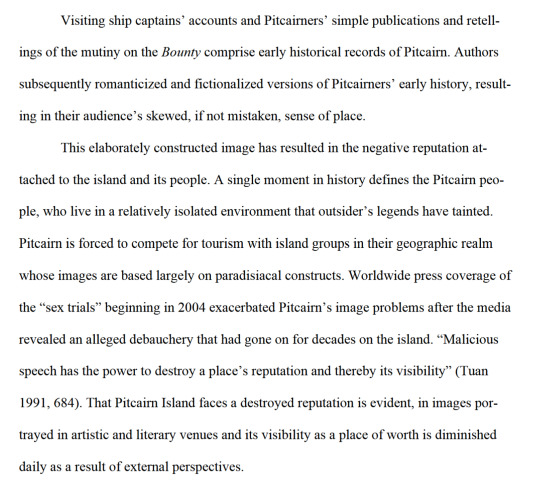
A single moment in history defines the Pitcairn people, except for that second moment in history where a third of the adult male population went to trial for "alleged debauchery" consisting of - let me check my notes - endemic levels of rape and child abuse to the degree that when investigators interviewed every woman they could find who grew up on the island, 100% had experienced sexual assault. This is definitely a matter of malicious speech and image problems based on mean outsiders obsessed with the mutiny on the Bounty. Economic sustainability through tourism is definitely a goal to work towards. Ignore the fact that there is literally an age restriction on tourism to the island because it's unsafe. Let's continue to use the phrase "alleged illegal sexual activities" despite writing this a decade after the trials were resolved with guilty verdicts on charges of child rape.

So sad that the revitalization program only ran from 2006 to 2004
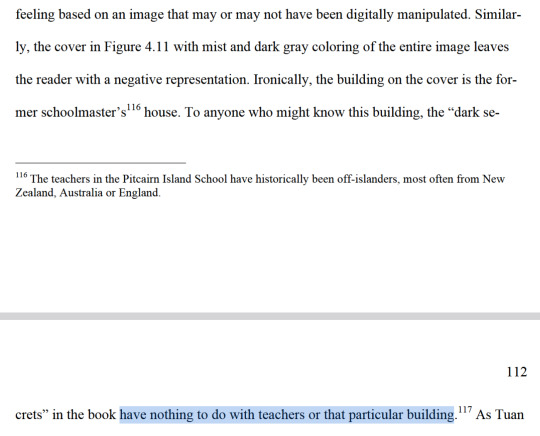
This is just a grotesque misrepresentation of the facts if you have read the victims' accounts, which include years of assault by a teacher; however, the teacher was deemed not fit to stand trial.
Further evidence that's given of the "construction of negative imagery of Pitcairn" is the fact that...the book "1000 Places to Visit Before You Die" doesn't choose to include Pitcairn.
Look. I am a comm/media scholar, plenty of my own work focuses on perception, image, and representation, but sometimes you have to acknowledge that PERCEPTION REFLECTS REALITY.
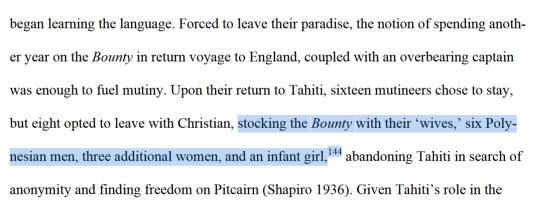
So we're just not going to acknowledge that this was kidnapping and enslavement done through deception
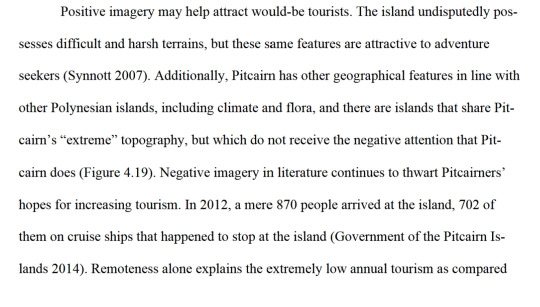
Again, do we really think negative imagery in literature is the driving factor here.

"This same sentiment should be held by the world" why
"the impact of an image of the island is taking its toll" atrocious English

This is a complete abdication of scholarly responsibility to examine your data honestly and critically. There is no critical examination whatsoever of what the actual well-documented consequences of this extremely insular "strong and devoted multiple-family structure" have been - that it enabled a decades long normalization of sexual abuse that trapped victims within a remote environment where their abusers held all the power and resources.
The methods section is possibly the worst part from an academic standpoint:
"Deep affinity for Pacific cultures and specific interest in Pitcairn’s history and particular systems drove initial efforts to contact and request licensing and permission to “land and reside” on Pitcairn, which was granted in 2004" .....If you are going to research romanticization of place and you include this statement at the start of your methods section, you'd think you'd do well to reflect on your own positionality, meaning your relationship to your study subject and how it effects your research. And yet, there is none of that, no discussion of limitations, and worst of all, virtually no discussion of the methods to a degree that makes the whole project untrustworthy.
In essence, what she did was a documentary review of historical and literary material coupled with interviews with the island residents, both remotely and during 3 months of fieldwork on the island. There is no discussion of the details of her interview and fieldwork process - how she connected with participants, what she did on the island, how the interviews were designed and conducted, any consent process, etc. Even how many interviews she actually did! Literally the only description of the fieldwork period is that it happened, that a second trip had to be cancelled because of logistics, and that "The opportunities granted to me by the Pitcairners continue to be appreciated, and plans to revisit the island for continued research will be made in the future." (she is so clearly covering her ass so that the islanders will let her back for future research)
Why this matters: there are about 40 people who live on this island. Everyone knows each other, most are related to each other, most of the abusers still live there. And you're not going to stop and think about what that means for the sort of answers you're going to get when you ask people what kind of place the island is? How that's going to skew what people are going to be comfortable being honest about? Or most important - how are you going to maintain the safety and anonymity of your participants if they discuss sensitive topics with you, when you are in this tiny community where everybody knows everybody else's business and your participant pool almost certainly includes abuse survivors? There's certainly no mention anywhere of IRB approval.
Deeply fucking unserious approach to ethnography. No wonder the closest she comes to acknowledging nuance is "Although negative perceptions of place(75) have been voiced, there is a long-standing history demonstrating attachment to place by the islanders, and the present population is dedicated to presenting their island in the best light possible using the most modern technologies." Footnote 75 reads: ""Hell," from a Pitcairn woman in the trials of 2004." The only fucking voice she gives to the survivors in 189 pages.
Further sins:
uncritical citations of Jared Diamond
really tries to make a lot of hay out of the fact that Pitcairn had female suffrage in 1838 and 'was founded by Tahitian matriarchs' (kidnapped Tahitian women who tried to leave as soon as they possibly could)
analysis is nominally on the concept of "place attachment" but never reviews place attachment literature. Otherwise she might have stumbled on one of the foundational aspect of the concept which is that you can't take attachment to place as a universal net positive! There's a significant body of work on negative place attachment in the context of domestic abuse, actually!
#yesterday's worldle was Pitcairn and i went down a very very bad very very grim rabbit hole#pitcairn islands#tw abuse#tw csa#i didn't really sleep last night
12 notes
·
View notes
Text
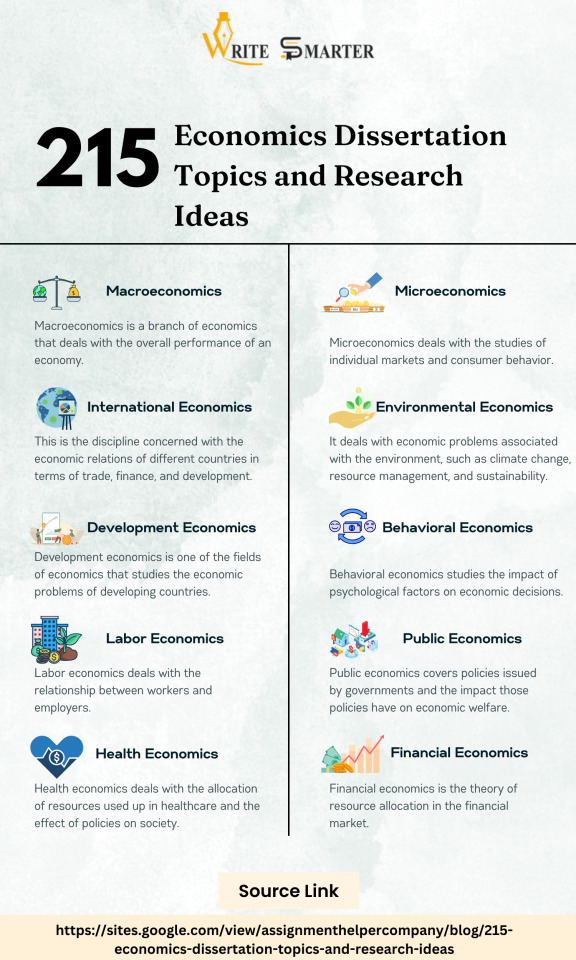
215 Economics Dissertation Topics and Research Ideas
To help you out, we have put together a list of 215 dissertation topicts and research ideas cutting across different subfields in the field of economics...
Source Link: https://sites.google.com/view/assignmenthelpercompany/blog/215-economics-dissertation-topics-and-research-ideas
#online dissertation help#economic assignment help#assignment help online#assignment writing services#assignment services#marketing assignment work
0 notes
Text
I think what people misunderstand when somebody says “x or y is political” is that we DO NOT mean “x or y is related to a certain political party or government” (necessarily). What “political” means in this context is “x or y caries cultural/social/economic (i.e. political) messages that you should be aware of as a human being existing in a politically constructed world.”
To clarify: you are an individual who has preferences and tastes. I am NOT saying any of these preferences or tastes are morally right/wrong/whatever. However, your tastes have not developed in a political vacuum. The fact that, for instance, you like a female protagonist with a strong but emotionally aware immortal/supernatural male love interest SAYS something about the cultural and political context you have grown up with. It says something about gender dynamics and relationships, about ideas around romance, about escapism, about expectations of self identity, etc. you could literally write a dissertation about any single aspect of that.
All of these tropes come from decades of literary and cultural interactions shaping and responding to consumers’ tastes. And this is to say nothing about how to even end up on a shelf, an author with their own biases (conscious or unconscious) had to write it, then a publisher and editor has to pick it up (with their own set of agendas and ideas of what will sell) and then a marketing team has selected an image and an angle to use to market that book. It then ended up on a bookshelf, or on your fyp with a specific set of hashtags. You chose that book because of your, politically significant, preferences and tastes. Those tastes did not appear in a vacuum. And the books available to satisfy those tastes did not appear from the void.
This is what we mean when we say books are political. You are a human. You live in an innately political society. Existence is political. Living is political. Don’t get mad when someone reminds you of that.
#i have thoughts#but like#I will stop myself here#I could talk about structuralism Vs culture#but that’s a bit much#book tok#booktok#book tumblr#politics#anthropology#sociology#culture
9 notes
·
View notes
Text
To Bet on the Future, You Must Believe in the Greatness of Your Civilization
Editor’s note: This is a modified version of a talk given at the Trad Dad conference in Battleground, Washington October 25, 2024.
Ifirst thought about the problem of birth rates while writing my dissertation on David Hume.
Hume’s essay “Of the Populousness of Ancient Nations” showed that ancient nations were more sparsely populated than modern ones. Modern freedom had caused the population growth underway during his lifetime, Hume argued. “In the flourishing age of the world,” Hume writes, “it may be expected, that the human species should possess greater vigour both of mind and body, more prosperous health, higher spirits, longer life, and a stronger inclination and power of generation.” Simply removing impediments like economic scarcity to the “desire and power of generation” will lead to an increase in population. As Hume predicted, Europe’s population grew with advances in industry and commerce, from about 120 million in 1700, to 210 million in 1800, and about 425 million in 1900 and about 750 million in 2000.
Yet something was missing in Hume’s analysis as I tested his thesis against current trends. Ben Wattenberg was the authority on population trends during the 1990s. At the time, more people like Paul Ehrlich and the Club of Rome worried about overpopulation. Wattenberg’s 1987 book The Birth Dearth: What Happens When People in Free Countries Don’t Have Children sounded the alarm about a population implosion. He even debated Ehrlich on Johnny Carson’s Tonight Show!
Time vindicated Wattenberg. Books like Phillip Longman’s The Empty Cradle: How Falling Birthrates Threaten World Prosperity and What to Do About It (2004) revealed a riddle. Ours was a period of industry and commerce and of declining birth rates. What did Hume get wrong?
6 notes
·
View notes